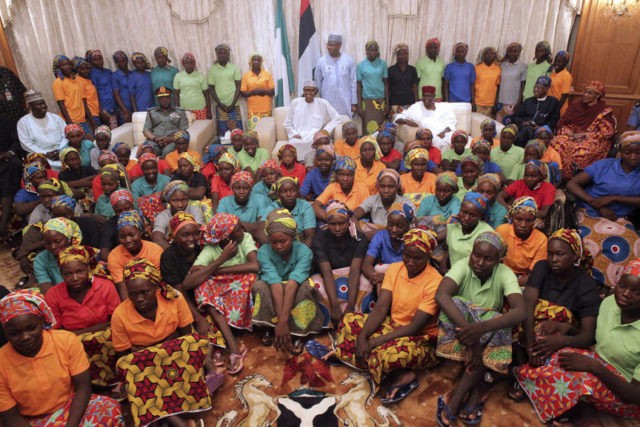Teen Girls Kill Twelve in Nigerian Market Suicide
Post# of 65629

< >

Nigerian news agencies reported Wednesday of multiple child suicide bombings targeting a market in the northeastern regional capital Maiduguri, killing at least 12 and confirming fears that the Boko Haram jihadist group continues to have the ability to use child captives for terrorist activity.
The newspaper Vanguard, which reported the casualty count as ten initially and “dozens” injured—cited a civilian militia leader’s witness account in reporting that two 13-year-old girls were responsible for the bombing.
“Two under-aged girls, aged about 13, struck at the market at about 4:10 pm (1510 GMT)—a peak hour,” Civilian Joint Task Force chief Ibrahim Liman told Vanguard. “The first bomber set off her explosives in a sparsely populated part of the market. Moments later, the second bomber set off her explosives in the crowded part of the market.”
Liman noted that 52 people were recorded injured at press time and the death toll could go up at any time.
Another eyewitness told the newspaper the attack was “really bad. … I saw one car parked across the road that was splattered with blood and flesh.”
The Premium Times, another Nigerian newspaper, identifies the attackers as “four female suicide bombers,” without providing an estimated age. The Times report cites the National Emergency Management Agency for the statistic and reports the death toll at 12. That agency stated that it had documented ten deaths, but local officials put the number at 12.
Borno state police added further confusion, identifying a “male suicide bomber” on the scene. Nigeria’s Pulse publication, citing eyewitnesses, say the culprits were two male suicide bombers.
Maiduguri, the capital of Borno, is the home city of Boko Haram. The Islamic State affiliate was founded there and continues to operate out of the nearby Sambisa forest, where Nigerian officials believe many of the thousands of hostages the terrorist group has abducted over the years are hidden. Boko Haram, whose name roughly translates to “Western education is forbidden,” specialize in mass abductions of girls and young women, later used as maids, cooks, child soldiers, suicide bombers, and sex slaves for their jihadi “husbands.”
Boko Haram’s most successful mass abduction occurred in the Borno village of Chibok in April 2014. The terrorists targeted a girl’s school in the village and abducted nearly 300 girls and women successfully, forcing them into their slavery. Most of these girls, many of which have become mothers in captivity since their kidnapping, remain in Boko Haram custody. Many are brainwashed and forced into submission to the terrorist group and, thus, present a security threat to officials once rescued—in one famous rescue in October 2016, nearly 100 Chibok girls refused to go with police.
Boko Haram inspired hope in the loved ones of the captive girls this week by releasing a 22-minute video showing 14 of the girls and some of the children they have had since 2014. Half of the video shows the girls, who urge their parents to “bow to Boko Haram” and promise, “by the grace of Allah, we will not return to you.” The girls also claim that they “lack nothing” and live a fulfilling life in captivity.
The other half of the video is a “13-minute-long sermon” by a man claiming to be Boko Haram leader Abubakar Shekau.
The video is an embarrassment for the Nigerian government, which has failed to rescue the girls as the four-year anniversary of their capture approached. The recent bombings—this week’s and a New Year’s bombing in Adamawa state—counter the Nigerian government’s persistent narrative that Boko Haram was defeated in 2015. President Muhammadu Buhari told the BBC that year that “technically, we have won the war.” Three years later, in an end of 2017 message, Buhari repeated, “We have since beaten Boko Haram.”
Boko Haram carried out 135 suicide bombings using children in 2017, according to UNICEF.
 (0)
(0) (0)
(0)